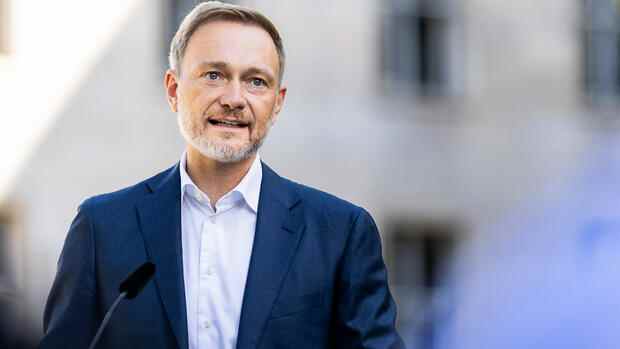The Federal Minister of Finance does not receive an exception from Brussels.
(Photo: IMAGO/photothek)
Brussels, Berlin The EU Commission will probably reject the plans of Finance Minister Christian Lindner (FDP). Lindner does not want to charge VAT on the new gas surcharge. However, a directive stipulates that all EU countries must demand at least five percent.
A spokesman for the commission said on Tuesday that they were aware of the difficulties in the member states and shared the federal government’s wish that the gas surcharge should not have any unintended consequences.
However, the directive does not provide for any possibility of exempting the levy from VAT liability. One is now in close contact with the German federal government to find measures “that have the same effect on end consumers,” said the spokesman.
The alternatives are now being discussed at the traffic light. It would be possible to reduce the tax on the surcharge to the minimum rate of five percent. At least that’s what it needs now, said Dieter Janecek, economic policy spokesman for the Greens.
Top jobs of the day
Find the best jobs now and
be notified by email.
SPD economic politician Falko Mohrs also agrees. “Now the tax has to be reduced to at least five percent,” he said. “We have to do everything we can to keep the levy as low as possible.”
Does a general tax cut on gas make sense?
Alternatively, the two coalition politicians do not consider it sensible to lower taxes on gas in general. “A general VAT reduction on gas is costly and not accurate,” explains Janecek. Mohrs fears an effect that the tax reduction could not be passed on to the citizens: “There are only the same annoyances as with the tank discount.” It is easier with the levy because the reduction would be clearly defined there.
But there are voices from the coalition who see things differently. “It’s about relief far into the middle of society. All instruments that can contribute to this are on the table,” said Hannes Walter (SPD), Vice-Chairman of the Economic Committee, the Handelsblatt. Walter can imagine a reduction in gas taxes in general or just in relation to the surcharge.
Lindner wrote to EU Monetary Commissioner Paolo Gentiloni and made two suggestions:
- First, he wants to change the VAT directive to make the exception explicitly possible. That would necessitate a legislative procedure and would therefore take time. The change would have to be officially proposed by the EU Commission, which, however, shows little motivation to do so. The policy has just been changed, the spokesman said.
- Second, Lindner wants to apply for an exception based on Article 395 of the directive. However, this paragraph only provides for exceptions “to simplify tax collection or to prevent tax evasion or avoidance”. The federal government justifies the request with the dissatisfaction of the population with the high energy prices. “There is no way to exempt this type of levy,” said the commission spokesman.
“From a legal point of view, nothing works,” said tax law expert Joachim Englisch from the University of Münster in the Handelsblatt. “Even with a generous interpretation, no exception can be justified with this article.”
>> Also read here: Gas surcharge is 2.419 cents: That’s how expensive winter is
However, there are other ways to achieve similar effects. VAT would amount to around 0.45 cents per kilowatt hour. If the Bundestag would temporarily exempt gas for heating from the energy tax, this would save around 0.55 cents per kilowatt hour.
“Such exceptions are explicitly provided for in the EU energy tax directive,” said Englisch. The EU member states have to decide on this in individual cases.
Another option would be to temporarily reduce VAT on gas. The Bundestag can also do this without the approval of Brussels if the rate does not fall below five percent. For the federal government, the route via the energy tax exemption would be more expensive. Because this benefits the federal government entirely, while the value added tax is divided between the federal and state governments.
>> Also read here: Shell waives money from new gas levy
Without a change in the law, VAT of 19 percent would be due on the gas levy. That would mean that a typical family with an annual gas consumption of 18,000 kilowatt hours not only has to pay a surcharge of 435 euros, but also around 93 euros in VAT. A single would come to about 23 euros VAT per year.
Other countries have fewer scruples about breaking EU rules. Since January 1, 2022, VAT has no longer been levied on gas and electricity in the Czech Republic, although this is clearly contrary to European law. The Czech Republic is simply taking the chance of infringement proceedings by the EU Commission.
More: Gas surcharge drives inflation – gas prices could still be capped


